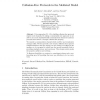Free Online Productivity Tools
i2Speak
i2Symbol
i2OCR
iTex2Img
iWeb2Print
iWeb2Shot
i2Type
iPdf2Split
iPdf2Merge
i2Bopomofo
i2Arabic
i2Style
i2Image
i2PDF
iLatex2Rtf
Sci2ools
101
click to vote
CRYPTO
2008
Springer
2008
Springer
Collusion-Free Protocols in the Mediated Model
Prior approaches [15, 14] to building collusion-free protocols require exotic channels. By taking a conceptually new approach, we are able to use a more digitally-friendly communication channel to construct protocols that achieve a stronger collusion-free property. We consider a communication channel which can filter and rerandomize message traffic. We then provide a new security definition that captures collusion-freeness in this new setting; our new setting even allows for the mediator to be corrupted in which case the security gracefully fails to providing standard privacy and correctness. This stronger notion makes the property useful in more settings. To illustrate feasibility, we construct a commitment scheme and a zeroknowledge proof of knowledge that meet our definition in its two variations.
Communication Channel | CRYPTO 2008 | Cryptology | Digitally-friendly Communication Channel | Stronger Collusion-free Property |
Related Content
| Added | 19 Oct 2010 |
| Updated | 19 Oct 2010 |
| Type | Conference |
| Year | 2008 |
| Where | CRYPTO |
| Authors | Joël Alwen, Abhi Shelat, Ivan Visconti |
Comments (0)

